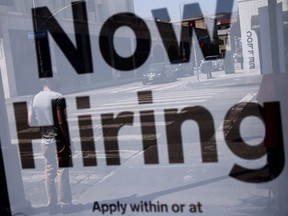Article content
It looks like interest rates will be going higher when the Bank of Canada next meets to set policy at the end of the month.
Kevin Carmichael: Employers added more than 100,000 positions in December, a number likely too robust for the Bank of Canada

It looks like interest rates will be going higher when the Bank of Canada next meets to set policy at the end of the month.
Story continues below
Canadian employers added more than 100,000 positions in December, a strong number that suggests the tailwind from acute labour shortages was at least as strong as headwinds from a spike in borrowing costs, plunging housing prices and worries about a global recession.
That’s positive. The economy created 381,000 jobs in a year when most of the headlines were negative. The unemployment rate dropped to five per cent, one of the lowest readings on record; total hours worked increased 1.4 per cent from a year earlier, a positive signal for fourth-quarter gross domestic product; and the size of the labour pool increased by 0.4 per cent, suggesting more people were keen to work.
Toronto-Dominion Bank economist James Orlando’s assessment was effusive. “The surge in employment and rise in the labour force make this an incredibly positive print,” he told his clients in a note. “The fact that most of the gains were full-time positions in the private sector and spanned many industries further supports the robustness of today’s numbers.”
Story continues below
Maybe a little too robust for Bank of Canada governor Tiff Macklem.
Hiring data are always important. These numbers are more important than usual because the Bank of Canada is unsure whether it’s raising interest rates enough to crush inflation, which jumped out of the central bank’s comfort zone in 2021 and remains uncontained.
The central bank spent almost all of 2022 trying to cool an economy that it said was in “excess demand,” stoking inflation to dangerous levels. Year-over-year increases in the consumer price index surged to 8.1 per cent in June, and were still hovering around seven per cent through the fall, well outside the Bank of Canada’s target of two per cent.
In response, policymakers pushed the benchmark lending rate to end the year at 4.25 per cent, a four-percentage-point increase from March, representing the most aggressive series of interest-rate increases in the Bank of Canada’s history.
Story continues below
Yet employers continued to report that they were desperately short of workers. They hired 104,000 people last month, Statistics Canada reported on Jan. 6, defying Bay Street expectations of a modest increase of around 5,000 positions. At five per cent, the jobless rate is much lower than anything mainstream economists tend to associate with “full employment,” the theoretical condition at which everyone who wants to work can find a job.
Full employment is a sign of strength, but it also suggests inflationary pressures are building. Average hourly wages were 5.1 per cent higher than December 2021, the seventh consecutive month that wage gains exceeded five per cent, Statistics Canada said. That’s an unusually strong rate of wage growth the Bank of Canada will see as evidence of inflation, as wage demands tend to influence prices for goods and services.
Story continues below
The hiring numbers will create dissonance for the multiple forecasters who published bleak outlooks at the end of 2022. Indeed, the Bank of Canada itself predicts that growth will stall over the next few months, implying a recession is possible. Many will point out that employment is a “lagging indicator,” reflecting decisions based on economic conditions months ago, rather than foresight about what might be coming. Still, there’s no denying the Canadian economy ended the year with considerable momentum.
“The jobs numbers might be backward looking, but through the end of 2022, the Canadian labour market remained rock solid,” Brendon Bernard, an economist at Indeed, a hiring website, said in an email. “The clouds on the horizon haven’t rained on the labour market’s parade.”
Story continues below



The central bank raised the benchmark interest rate another half point on Dec. 7, but for the first time in more than a year, policymakers said they would consider a pause when they next meet to consider the interest-rate setting. That decision comes on Jan. 25, so December and January data will determine whether borrowing costs have peaked.
The latest inflation reading sent an unconvincing signal. The headline rate cooled to 6.8 per cent in November from 6.9 per cent in October. The drop was positive, but the sluggishness of the decline suggests stickiness.
Story continues below
All things equal, strong hiring numbers suggest demand will continue to put upward pressure on inflation, which argues for higher interest rates. Macklem said in December that he “won’t sleep easily” until inflation is back at two per cent. That probably means another interest-rate increase this month, although perhaps by only a quarter point.
“Thought the Bank of Canada has signalled it could go either way with its next policy decision, the continued strength in employment means that the bank isn’t done yet,” Orlando said.
• Email: kcarmichael@postmedia.com | Twitter: carmichaelkevin
Story continues below